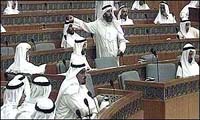Kuwait parliament to refer electoral reform bill to court
Parliament voted Tuesday to refer an electoral reform bill to the Constitutional Court the latest development in weeks of political feuding in Kuwait over the proposed legislation. Opposition lawmakers boycotted the vote and instead joined a crowd of some 200 pro-reform demonstrators in the streets outside the parliament building. The dispute, which has dominated politics in this tiny oil-rich nation ahead of next year's parliamentary election, is over the number of electoral constituencies.

A government appointed ministerial committee recently recommended that the current number of 25 constituencies be reduced to 10. Supporters of the plan the liberals, Islamists, and independents who boycotted Tuesday's vote argue that fewer constituencies would reduce electoral fraud and vote buying. Referring the issue to the Constitutional Court, they say, is designed to stall the reform process.
In a bid to reassure supporters of the committee's recommendations, Prime Minister Nasser Al Mohammed Al Sabah told parliament Tuesday that the Constitutional Court would only strengthen the government's argument. "The reason for the referral is to entrench it, make it immune," said Al Sabah.
Kuwait's legislature has 50 elected deputies, but all 16 Cabinet members have the right to vote in parliament. Despite the boycott by more than half of the elected lawmakers, all 16 cabinet members were present and voted in favor of referring the issue to the Constitutional Court. The drama that unfolded Tuesday began a day earlier, when parliament speaker Jassem Al Kharafi suspended the parliament session when rowdy, pro-reform spectators heckled lawmakers and nearly 30 opposition lawmakers stormed out.
Kuwait introduced a major piece of political reform last year when parliament voted to grant women the right to vote and run for office for the first time. However, the government continues to rebuff calls for political parties to be legalized. Also to the dismay of reform proponents, key Cabinet posts continue to be held by members of the ruling Al Sabah family, reports the AP.
N.U.
Subscribe to Pravda.Ru Telegram channel, Facebook, RSS!


